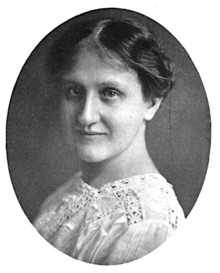Clara Sears Taylor

Clara Sears Taylor (October 2, 1876 – after 1938) was an American writer, editor, publicist, and government official, appointed in 1920 by President Woodrow Wilson to serve on the Washington D. C. rent commission. She was the first woman appointed to that office.
Early life
Clara C. Sears was born in Denver, Colorado, the daughter of Jasper Peck Sears Jr., a businessman in Denver, and Annie Love George Sears Stevenson. Her father was born in Ohio and her mother's family was from Missouri.[1]
Career
Clara Sears Taylor was a journalist in Denver.[2] She was a member of the Colorado Suffrage Association, and president of the Denver Woman's Press Club.[3]
During World War I, Taylor worked for the Creel Committee, as director of publicity for the women's division.[4] She was later named acting director of publicity at the Department of Labor.[5] "My job is to put war before them every day of their lives," she said of her readers. "To make them feel every day that their tasks are vital to the outcome. We have reached the stage that everyone must work, and work until the war is over."[6]
Taylor was the first woman to serve as rent commissioner of Washington D. C., when she was appointed by Woodrow Wilson in 1920.[7] "Mrs. Taylor's womanly judgment and sympathetic insights into family problems injects the workable, 'human' warmth," commented reporter Zoe Beckley.[8] She was part of the so-called "Woman's Cabinet", a group of women in prominent government posts in Washington, immediately after women's suffrage was won.[9] Among her controversial ideas, she proposed a federal tax on bachelors to encourage young men to marry.[10] She was also concerned the low government wages were contributing to discouragement and immorality in the capital.[11] She was on the advisory council of the 1923 Better Homes Week campaign chaired by Herbert Hoover.[12]
Personal life
Clara Sears married Eugene Whitman Taylor, a Denver newspaper editor, in 1901.[13] They had two children, Sears and Eugenie. Clara was widowed in 1915.[14] Her son Sears Taylor, a magazine editor, died in 1931.[15][16] In 1938 she was living in the New York City household of her younger sister Lydia (called Lillie) and her brother-in-law, drama critic Burns Mantle.[17]
References
- ↑ Clara Sears Taylor, in Who's Who in the Nation's Capital (Consolidated Publishing Company 1921): 385-386.
- ↑ James Alexander Semple, ed., Representative Women of Colorado (Alexander Art Company 1914): 115.
- ↑ John William Leonard, Woman's Who's Who of America (American Commonwealth Publishing 1914): 803.
- ↑ "Tells Public of Women's War Work" Chronicle-Telegram (January 24, 1918): 3. via Newspapers.com

- ↑ "Named by Wilson for Federal Job" Charlotte News (May 14, 1920): 15. via Newspapers.com

- ↑ "Woman Cheers Up Workers in Effort to 'Sell the War'" New-York Tribune (August 27, 1918): 7. via Newspapers.com

- ↑ "Rent Board Adds Woman Member" Washington Post (May 5, 1920): 7. via Newspapers.com

- ↑ Zoe Beckley, "Rent Courts End Landlord Tyrrany" Times Herald (September 3, 1920): 14. via Newspapers.com

- ↑ "Let Us Introduce the Woman's Cabinet" Oakland Tribune (November 7, 1920): 6. via Newspapers.com

- ↑ "Proposes Federal Tax on Being Bachelor" Huntington Herald (January 14, 1921): 1. via Newspapers.com

- ↑ "Finds City Morals Going" Washington Times (November 18, 1922): 1. via Newspapers.com

- ↑ "National Groups Plan Better Homes Campaign for 1923" New York Times (April 1, 1923): RE1.
- ↑ "Miss Clara Sears Married" Rifle Reveille (April 12, 1901): 1.
- ↑ "City Editor of Denver Post Dead" Walsenberg World (April 22, 1915).
- ↑ "Sears Taylor, Young Editor, Dies" Indianapolis News (November 4, 1931): 15. via Newspapers.com

- ↑ "Sears Taylor Dies" New York Times (November 5, 1931): 23.
- ↑ Brooks Atkinson, "Keeper of the Drama's Books" New York Times (September 11, 1938): 185.
External links
- A photograph of Clara Sears Taylor (circa 1920) in the Library of Congress.